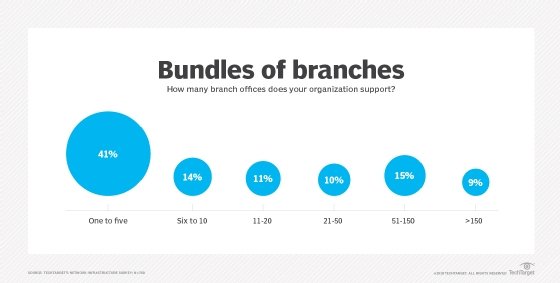remote office/branch office (ROBO)
What is a remote office/branch office (ROBO)?
A remote office/branch office (ROBO) is a corporate business site located at some distance from the organization's headquarters or main office.
In today's global business environment, the model of having multiple office locations is widespread, catering not only to the main urban hubs, but also extending to regional and, sometimes, remote areas. ROBOs are quite fundamental in how many businesses operate effectively across dispersed geographies.
What is the functionality of a remote office/branch office?
ROBOs typically offer localized services or support, operating semiautonomously. Often, these offices are set up in different cities, states or even countries from where the main office is situated. Generally, a ROBO is a smaller office than the company headquarters.
A ROBO may operate similarly to the main office or may be a separate business unit or provide some specialized service. Companies also sometimes have separately located offices for importing, exporting, retail locations, service and taxation for logistic or legal reasons. A business typically considers opening a ROBO when employees must travel to a specific location frequently or when it is the most effective way to serve a profitable market.
The importance of ROBOs in modern business
ROBOs are crucial for companies looking to expand their reach without massively scaling up their main office. This decentralization enables targeted management and resources that align with local business climates and client or customer demographics.
In addition, the strategic location of ROBOs enhances customer service and can offer quicker, more tailored responses to local market needs.
Ultimately, the success of a ROBO heavily depends on IT infrastructure and communication technology. Ensuring that these branch offices are well connected and efficiently integrated with the headquarters requires advanced network solutions, such as virtual private networks, cloud computing services and cybersecurity measures.
This technological backbone helps maintain communication, secure data exchange and sustain consistent business operations across all locations.

Challenges and considerations for ROBOs
Setting up a ROBO involves considerable planning and insight, blending technology with thoughtful management to ensure seamless operations and compliance across diverse regions. ROBO setups present unique challenges, notably in terms of ensuring data integrity and system reliability.
Often, these remote sites may not have experienced IT personnel on-site, relying instead on limited backup hardware and employees who handle critical data backup and recovery as a secondary responsibility. This situation can compromise data integrity and data recovery processes, making clear, efficient solutions essential for maintaining operational continuity.
To overcome these challenges, organizations increasingly turn to centralized backup systems, which automate the replication of data from remote offices to the main headquarters. Cloud backup services are also gaining traction.
By replicating remote site backups to the cloud, companies can ensure fast local restores, while also safeguarding data through off-site copies intended for disaster recovery. This method not only enhances data security, but also addresses potential operational vulnerabilities in remote setups.
Administrative factors for remote offices/branch offices
On the administrative side, several critical considerations must guide the setup and ongoing management of ROBOs:
- Legal and compliance issues. Each region where a ROBO is set up can have different legal requirements that impact business operations. All branch offices must adhere to and comply with local regulations and corporate policies to avoid legal complications and foster trust.
- Cultural and linguistic factors. In international locales, cultural differences and language barriers may present challenges that can affect the cohesiveness and efficiency of operations. Addressing these issues through effective training and strategic local hiring can bridge gaps in understanding and service, enhancing local responsiveness and integration.
- Management and coordination. To ensure consistency across varied locations, rigorous management and coordination are crucial. Maintaining high standards and uniform practices across all sites requires a concerted effort from central headquarters to effectively manage these extensions of the company.
By approaching the challenges and considerations of ROBO settings with a comprehensive and empathetic strategy, organizations can achieve not only geographic expansion, but also a deeper connection with diverse market needs.
ROBO setups play an indispensable role in the scalability and localization of services, enabling businesses to maximize their operational reach and efficiency. While they come with their sets of challenges, the strategic benefits they offer make them a vital component of modern corporate strategies in our increasingly interconnected world.
By understanding the role and function of ROBOs, companies can better plan their expansion strategies, ensuring that they not only grow, but also meet the specific needs of customers in diverse geographies with empathy and expert understanding.
Virtualization brings cost benefits and saves time for IT teams that oversee ROBOs. Read how effective implementation of virtualization in these scenarios requires cloud-based management tools and enough network bandwidth.
